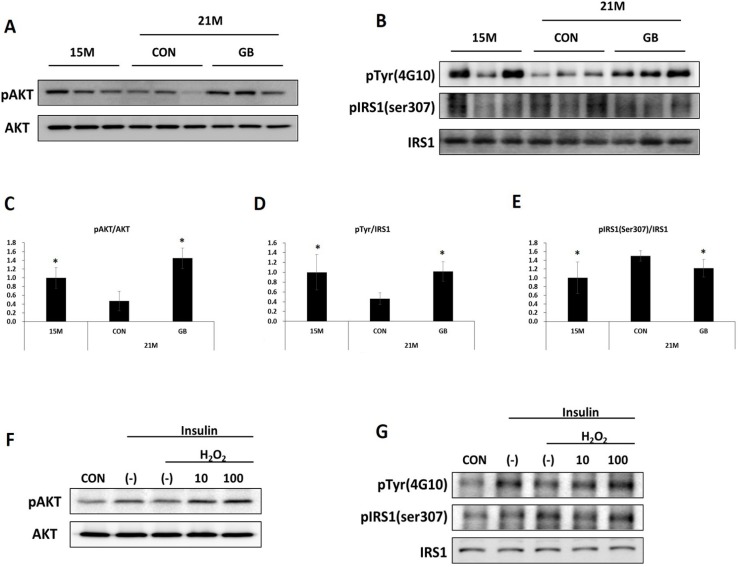Figure 5.
Ginseng berry (GB) extract supplementation increases protein kinase B (AKT) and insulin receptor substrate-1 (IRS-1) in skeletal muscle of aged mice. (A–E) Fifteen-month-old mice were fed a regular diet (CON) or regular diet supplemented with 0.05% ginseng berry extract (GBD) for 6 months (n = 8 in each group). Skeletal muscle tissue was collected 7 min after insulin injection (2 U kg−1, i.p.). (A) Protein expression of AKT and its phosphorylated form (pAKT) was determined by western blot. (B) IRS-1 was immunoprecipitated from whole lysate of skeletal muscle with anti-IRS-1 antibody, and immunoprecipitates were immunoblotted with anti-IRS-1, anti-tyrosine (anti-Tyr) or anti-phospho IRS-1 (anti-pIRS-1) (Ser307) antibodies. (C–E) The images from (A) and (B) were analyzed through ImageJ software (National Institutes of Health, Bethesda, MD, USA) for Windows. * p < 0.05 vs. 21 months CON. (F–J) C2C12 cells were differentiated for 1 week and then treated with 100 μM H2O2 with or without GB (10 or 100 μg mL−1) for 24 h. After 2 min of 50 μM insulin treatment, cells were harvested. (F) Protein expression of AKT and pAKT was determined. (G) IRS-1 was immunoprecipitated from whole cell lysate with anti-IRS-1 antibody, and immunoprecipitates were immunoblotted with anti-IRS-1, anti-phospho- tyrosine (anti-p-Tyr) or anti-pIRS-1 (Ser307) antibodies. (H–J) The images from (F) and (G) were analyzed through ImageJ software for Windows. * p < 0.05 vs. insulin treated H2O2-(–).


